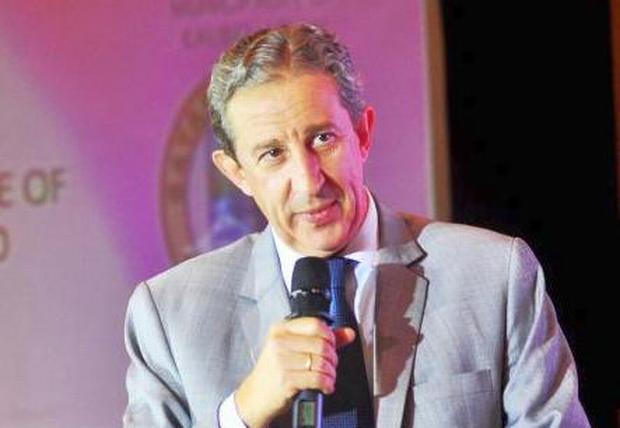Spanish envoy vows to keep sending Filipino scholars to Spain

Ambassador Luis Antonio Calvo Castaño delivers a speech at an event of the Philippine Commission on Women on March 3, 2017, (Photo from the website of the Philippine Commission on Women)
The Spanish Embassy in Manila vowed on Monday to continue sending Filipino students to Spain to give them the opportunity to pursue studies and research as a way of strengthening its diplomatic ties with the Philippines.
Spanish Ambassador to the Philippines Luis Antonio Calvo Castaño hosted a reception on Monday night for Filipino scholars who have finished its various scholarship and mobility programs as part of the celebration marking 70 years of Philippine-Spain diplomatic relations.
In an interview, Calvo said the scholarship programs helped in the exchange of cultural experience between Spain and the Philippines and this continued to deepen the ties between the two societies.
“[By sending Filipino students to study in Spain], you bring the Spanish experience to the Philippines and in the same way, take the Filipino experience to Spain. This is a very important contribution to our relations and we would like to continue that,” said Calvo.
He noted that culture was sometimes overlooked as the two countries belonged to the “same cultural environment.” The Philippines was a colony of Spain for 333 years from 1521 to 1898. Formal diplomatic relations were established in September 1947.
“We would like to offer the Spanish experience and capabilities to train young professionals in the Philippines,” said Calvo, noting that Spain’s higher education institutions offer a high degree of competency to both local and foreign students.
He also said that through its mobility programs, it can also address the mismatch between the universities and the job market in the Philippines.
“In the case of Spain, we have a high degree of high education in different specialties,” Calvo said. “We are sending our young students and professionals outside because of the crisis and they are hired immediately by transnational companies because they are very well trained.”
“We have the capacity to train other students, the Filipinos are especially welcome,” he added.
For her part, Bataan Rep. Geraldine Roman, who was the guest of honor at the reception, said her learnings and experience in Spain would aid her in crafting measures in Congress, particularly in pushing for federalism and a universal healthcare system in the country.
Roman pursued a master’s degree in Spanish Language and in Journalism in Spain through a scholarship. She also worked as a senior editor at the Spanish News Agency before she returned to the Philippines in 2012.
“My main reference point is the federalist state in Spain,” Roman said in an interview with reporters. “You have a central government but you have autonomous regions and each has its legislative and executive branches. That example is very clear to me.”
The scholarship programs offered by Spain include the Erasmus Plus (formerly known as Erasmus Mundus program) and the Hispanex Grants
program, which is aimed at promoting cultural research and dissemination of Hispanic Studies.
Spain also offers educational grants for master’s studies for civil servants and staff in the public systems in the fields of development, environmental studies, gender, education, agriculture and teaching of Spanish. /atm














